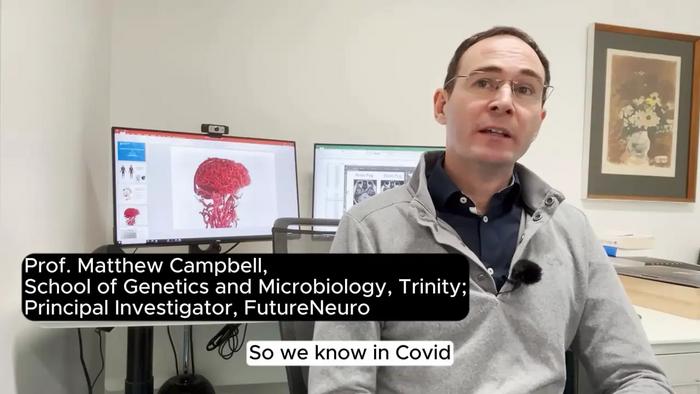Today, a team of scientists from Trinity College Dublin and investigators from FutureNeuro announced a major discovery that has profound importance for our understanding of brain fog and cognitive decline seen in some patients with Long COVID.

Credit: Trinity College Dublin
Today, a team of scientists from Trinity College Dublin and investigators from FutureNeuro announced a major discovery that has profound importance for our understanding of brain fog and cognitive decline seen in some patients with Long COVID.
In the months after the emergence of the novel coronavirus SARS-CoV2 in late 2019 a patient-reported syndrome termed Long-COVID began to come to the fore as an enduring manifestation of acute infection.
Long COVID has up to 200 reported symptoms to date, but in general patients report lingering symptoms such as fatigue, shortness of breath, problems with memory and thinking and joint/muscle pain. While the vast majority of people suffering from COVID-19 make a full recovery, any of these symptoms that linger for more than 12 weeks post infection can be considered Long COVID.
Long COVID has now become a major public health issue since the outbreak of the pandemic in 2020. While international incidence rates vary, it is estimated to affect up to 10% of patients infected with the SARS-CoV2 virus. Of these patients suffering from Long-COVID, just under 50% of them report some form of lingering neurological effect such as cognitive decline, fatigue and brain fog.
Now, the findings reported by the Trinity team in the top international journal Nature Neuroscience showed that there was disruption to the integrity of the blood vessels in the brains of patients suffering from Long COVID and brain fog. This blood vessel “leakiness” was able to objectively distinguish those patients with brain fog and cognitive decline compared to patients suffering from Long-COVID but not with brain fog.
The team led by scientists at the Smurfit Institute of Genetics in Trinity’s School of Genetics and Microbiology and neurologists in the School of Medicine have also uncovered a novel form of MRI scan that shows how Long-COVID can affect the human brain’s delicate network of blood vessels.
“For the first time, we have been able to show that leaky blood vessels in the human brain, in tandem with a hyperactive immune system may be the key drivers of brain fog associated with Long COVID. This is critically important, as understanding the underlying cause of these conditions will allow us to develop targeted therapies for patients in the future,” said Prof. Matthew Campbell, Professor in Genetics and Head of Genetics at Trinity, and Principal Investigator at FutureNeuro.
This project was initiated by a rapid response grant funded by Science Foundation Ireland (SFI) at the height of the pandemic in 2020 and involved recruiting patients suffering from the effects of Long-COVID as well as patients who were hospitalised in St James’ Hospital.
“Undertaking this complicated clinical research study at a time of national crisis and when our hospital system was under severe pressure is a testament to the skill and resource of our medical trainees and staff. The findings will now likely change the landscape of how we understand and treat post-viral neurological conditions. It also confirms that the neurological symptoms of Long Covid are measurable with real and demonstrable metabolic and vascular changes in the brain,” said Prof. Colin Doherty, Professor of Neurology and Head of the School of Medicine at Trinity, and Principal Investigator at FutureNeuro.
Moving beyond COVID-19
In recent years, it has become apparent that many neurological conditions such as Multiple sclerosis (MS) likely have a viral infection as the initiating event that triggers the pathology. However, proving that direct link has always been challenging.
Prof. Campbell added: “Here, the team at Trinity was able to prove that every patient that developed Long-COVID had been diagnosed with SARS-CoV2 infection, because Ireland required every documented case to be diagnosed using the more accurate PCR-based methods. The concept that many other viral infections that lead to post-viral syndromes might drive blood vessel leakage in the brain is potentially game changing and is under active investigation by the team.”
Dr Chris Greene, Postdoctoral research fellow and first author of the study, added: “Our findings have now set the stage for further studies examining the molecular events that lead to post-viral fatigue and brain fog. Without doubt, similar mechanisms are at play across many disparate types of viral infection and we are now tantalisingly close to understanding how and why they cause neurological dysfunction in patients.”
Journal
Nature Neuroscience
DOI
10.1038/s41593-024-01576-9




